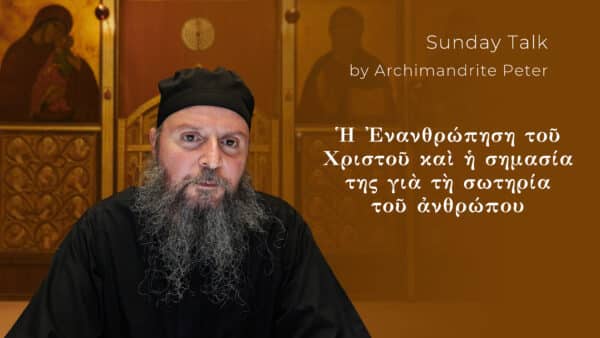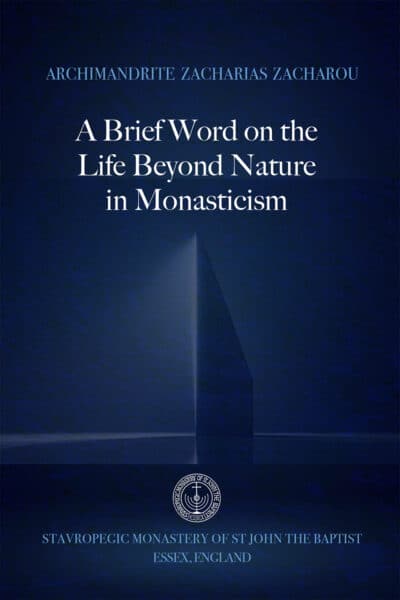One might ask why this long preparation for the gift of both the Resurrection and Pentecost is needed, since God never ceases to bestow His benefits on us. It is because being defiled by sin, man is not able to receive even a little grace from God. He must cultivate within himself a state that is, be it only in a little measure, compatible with God’s gift. In order to enter into communion with God, Elijah and Moses walked forty days in silence, with prayer and fasting, to the mountains of ascent, Horeb and Sinai. As food and source of inspiration, they had the thought of God, prayer, the expectation of their meeting with the Eternal and All-good Being. The two prophets were walking upon the earth but, in reality, they were walking from earth to heaven, from the flesh to the spirit. They ascended and God condescended: to the one in the ‘gentle breeze’, to the other in the cloud of glory. During this journey from the slavery of the passions to the freedom of the Spirit, the nature of earthly man is strengthened, so that it may not melt at the touch of the Heavenly Fire. In this world, everything flows and is constantly changing, but there is one fact that remains constant, that at some point the end will come. The life of every man is a journey towards the end of time. Every Sunday and every feast day, in general, is a milestone on this path; it anoints the tedium of this temporary life with the seal of eternity.
Today’s Gospel reading1Mark 15:43-16:8. describes how the Body of Christ was taken down from the Cross and buried. In the general atmosphere of fear that followed the Lord’s Crucifixion, only Joseph of Arimathea dared to seek Pilate’s permission to bury the dead Body of the Lord. He found such courage because ‘he also waited for the Kingdom of God.’ The living expectation that Joseph had in his heart for the Kingdom to come, made him as brave as a lion. He defied the fear of the Jews, but at the same time, out of love and reverence for the Lord, he was constrained by another kind of fear. He trembled as he offered the due burial rites to the Body that had become all one ‘putrefying sore’, ‘that by His stripes we may be healed’.2Isa. 53:5. The Myrrh-bearing women also had hearts that burned with desire to offer the myrrh of their love to the Master. The Lord had died on the Cross, but He was alive in their hearts. There can be no genuine faith in the divinity of Christ without hope and expectation of the Lord. At every Divine Liturgy, we make the confession which gives meaning to our whole life: ‘I look for the resurrection of the dead and the life of the world to come.’ The last times and the Second Coming of the Lord are not something that the Christian awaits passively. St Paul defines the measure of the perfect as the unrelenting pursuit of ‘the prize of the higher calling of God in Christ Jesus’, which causes man to ‘forget those things which are behind and reach forth unto those things which are before’.3Phil. 3:13-15. Also St Peter speaks of ‘hastening unto the coming of the day of God’.42 Pet. 3:12. Eschatological anticipation in the depths of the heart imparts strength, inspiration, opens new horizons, and prevails even over the fear of death.
Whoever is marked by the grace of the eternal Presence of the Lord, has known the Day of the Lord, ‘which Abraham saw and was glad’5John 8:56., and which is not limited in time to the end of the world, but dawns upon every man who is illumined by the tender Light of the glory of God already in this life. The ‘end’ erupts into the present life every time man comes into contact with the Spirit of God. That which attracts the grace of the Holy Spirit to the soul and therefore, indeed, hastens the coming of that Day, is self-reproach, tears of repentance and charismatic despair with faith in the ocean of divine mercy. Every touch of the Holy of Holies plants the seed of eternity in the depths of the heart. In man’s presentation before the eternal God the conventional notion of time is abolished. Through repentance, the past ceases to weigh on him with its failures, mistakes and sins, while by surrendering with trust to the divine will he is freed from anxiety about the future. The only thing that has enduring value is man’s desire for God at the particular moment of prayer.
The Light of the Day of the Lord presupposes a certain likeness to the ethos of Christ, that is, extreme self-emptying and humility; but it is also a judgment before the final Judgment, for it reveals the hidden content of man. It shows who abides in falsehood, and who loves God to the point of forgetting himself and loving not his life ‘unto death’.6Rev. 12:11. At the same time, however, the Light frees such a one from the Judgment to come, because ‘God does not judge twice’.71 Cor. 11:31. He tastes true freedom, the victory over sin and death, which is possible only in the perspective of eternity. On the contrary, without eschatological expectation, man will waver, he will falter and he will be ‘double minded and unstable in all his ways’.8Jas. 1:8. That is why St Paul exhorts Timothy: ‘Remember Jesus Christ raised from the dead’91 Tim. 2:8. Only by keeping the sensation of the risen Christ’s presence in his heart can the Christian nurture a living hope, which makes him stronger than death.
Man proceeds towards the ‘end’, while God continuously descends on earth, an event experienced with great clarity in the Divine Liturgy, which commemorates the Sacrifice of Christ, but also ‘His coming again a second time in glory’. Thanksgiving is offered, because God has ‘already bestowed upon us His Kingdom to come’. In the Divine Liturgy, the Christian receives the life of Christ through communion in His Body and Blood. Grace imparts to the heart the vision of the world to come. The ethos of the Liturgy kindles the desire to give thanks to our Benefactor and begets the zeal to imitate the example of the Lord. Man’s realisation at every step that he fails in this task engenders in his heart endless repentance, to the point of hating himself. Then he begins to learn from Christ and to become like unto Him, expressing the content of his own hypostasis through self-hatred out of love and gratitude for the Almighty Jesus. Today’s Gospel places us in the heart of the spirit of this period. Its message has also been expressed by Christ, when He said: ‘Where your treasure is, there will your heart be also’.10Matt. 6:21. If we have our hope and our mind in the Lord, then our life gradually enters and concentrates in the Person of our Lord Jesus Christ: our life is ‘hid with Christ in God’, in the heavens, and it will appear when the Lord comes again in glory.11Col. 3:3-4. Then the content of the life of each man shall be revealed. Whatever he has stored in the Lord, that he will have when the Lord comes to judge the living and the dead.
Footnotes
- 1Mark 15:43-16:8.
- 2Isa. 53:5.
- 3Phil. 3:13-15.
- 42 Pet. 3:12.
- 5John 8:56.
- 6Rev. 12:11.
- 71 Cor. 11:31.
- 8Jas. 1:8.
- 91 Tim. 2:8.
- 10Matt. 6:21.
- 11Col. 3:3-4.



